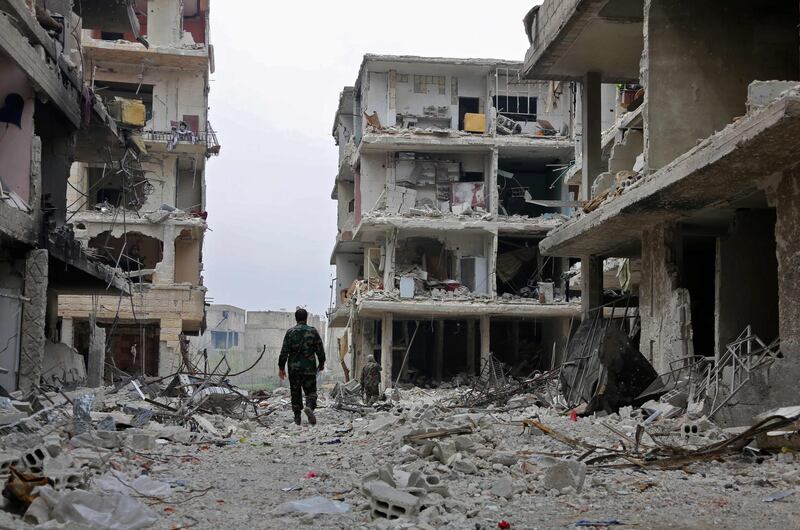A new UN initiative offers some hope for Syrians who have worked to collect evidence of atrocities committed in the country’s ongoing civil war, but doubts remain on anyone ever standing trial.
Investigators have begun to sift information as part of an “International, Impartial and Independent Mechanism” created by the UN in 2016 to compile files that could be used by any jurisdiction — domestic or international — capable of prosecuting alleged perpetrators of war crimes in Syria.
"We are faced with unprecedented volumes of information," Catherine Marchi-Uhel, the French judge leading the investigation, told reporters in Geneva.
She added that her team was setting up IT systems capable of managing the vast amounts of data.
Jalal Al Hamad, who heads Justice for Life, a non governmental organisation focused on eastern Syria, said: “This mechanism opened a door of new hope, even though it is a small door, of holding criminals in Syria accountable.”
Mr Al Hamad has since 2012 up until last year collected evidence of massacres, deaths under torture and other crimes.
Collection of evidence was often taken at great personal risk.
For Mr Husam Al Nahhas — a doctor who helped collect evidence of potential chemical weapons use by government forces in northern Syria from 2012 to 2015 — the danger did not just come from warring factions but also from the nature of the evidence he was collecting.
“With no protection inside Syrian territory, I was responsible for myself,” he said. “I also had to take personal protection measures against exposure to chemical agents or secondary contamination.”
______________
Read more
Will Idlib become Bashar Al Assad's next killing ground?
Fresh rebel withdrawals from Syria's shrinking Ghouta
After fall of Eastern Ghouta, Syria civil war has graduated to new phase
______________
Judge Marchi-Uhel was appointed last July and published her first report this week. She said her team was still at the data gathering and sorting stage, but that it was already clear it was "not going to be in a position to investigate each and every crime”.
“That would be an impossible task,” she said. "Exercising our discretion when selecting cases is going to be a crucial aspect of the work.”
Judge Marchi-Uhel said the team would focus on where it is possible to "establish responsibility of high-level perpetrators" and on those involving sexual and gender-based crimes as well as violations against children.
"We are looking for individual criminal responsibility," she added.
Both Mr Al Hamad and Judge Marchi-Uhel, however, acknowledge that despite their work, the options for prosecuting perpetrators in Syria's conflict remain slim.
The UN Security Council has ignored repeated calls to refer the Syria case to the International Criminal Court, while using Syria's domestic courts is not an option.
The window for evidence collection could also be closing. Mr Al Hamad and Mr Al Nahhas said that the greatest challenge was collecting evidence in areas controlled by the government of Syrian President Bashar Al Assad, whose forces have retaken significant amounts of territory from rebel groups in the last year.
Even as the UN begins to examine the evidence of past crimes, it appears impotent in the face of new ones. At a security council meeting on Tuesday, members traded blame over their unheeded demand for a 30-day ceasefire in Syria.
"History will not be kind when it judges the effectiveness of this council in relieving the suffering of the Syrian people," said US Ambassador to the UN Nikki Haley, adding that it "should be a day of shame for every member”.
The call for a ceasefire is a response to an intense Syrian government campaign, backed by Russian air power, against rebel-held areas in Damascus that has left more than 1,600 people dead since late February.
The Syrian government’s recent offensives have kept Mr Al Hamad and his group busy.
“We have issued a report containing many testimonies that the forces of the Syrian regime and its Russian and militia allies committed horrific massacres in the second half of 2017 and displaced hundreds of thousands and killed hundreds of civilians as a result of indiscriminate shelling of civilian areas,” Mr Al Hamad said.
Though the Syrian government is believed to be the most significant perpetrator of atrocities in the conflict, Mr Al Hamad said his team had also documented crimes by groups fighting the government, including some of the largest rebel groups in the country.
“They and other factions had secret prisons and tortured detainees,” he said.
*Additional reporting by Ahmed Barakat in Turkey





